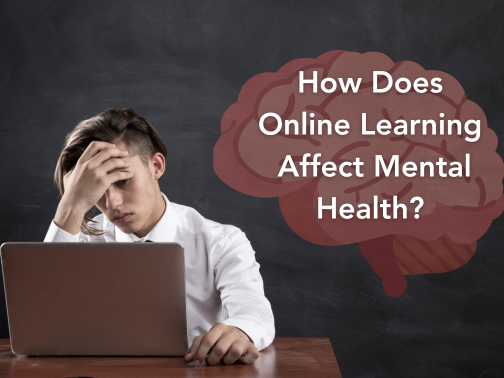Contents
Toggle
Meet David De’ Ath, founder, editor, and writer at Wonderful World English. With his extensive background as an English teacher, David provides valuable insights and practical tips on ESL for students and teachers alike. This information has been fact-checked by MPhil scholar and educational researcher, Beenish Aslam.
The world has seen a massive shift toward online learning in recent years.
This was only accelerated following the advent of the COVID-19 epidemic at the turn of the decade.
Due to its convenience and lack of direct contact with others, online learning is the perfect alternative for those who still want to study when in-classroom teaching is not an option.
On top of this, online learning is considered an excellent method of instruction because it provides flexibility, and accessibility, and allows people to learn from the comfort of their homes.
However, online learning also has some disadvantages, including the negative impact on mental health.
Scientists and neurologists have performed numerous studies on the effects of online learning on mental health. The most negative effects of excessive online learning are causing the learner to feel isolated, increasing stress and anxiety, reducing motivation, and negatively impacting academic performance.
I am an experienced educator who sought the expertise of a medical expert to help me with the research for this article.
We will explore the effects of excessive online learning on mental health.
Of course, it’s not good to be glued to a screen, and it can harm anyone’s health.
This article is a detailed guide on how online learning can affect the mental health of humans as well as their productivity.
Let’s jump in.
How Does Online Learning Affect Mental Health?
Numerous studies have been done on the impact of online learning on human mental health, especially following the COVID-19 pandemic, when the globe shifted toward virtual learning.
This has left many parents and learners particularly concerned about what all this online learning is doing to our mental health.
In moderation, online learning can be very effective, but if it is the sole form of study, evidence shows us that it can harm mental well-being.
It’s important to note that everyone is different, and some may be more impacted than others, although studies have shown these results, so we want to make you aware of them today.
The following are some of the most significant effects of online learning on mental health:
1. Students can Feel Isolated
One of the drawbacks of online learning, particularly for teenage learners, is that they feel isolated and socially disconnected.
This can be a significant problem for students who like to interact with others and prefer face-to-face learning methods.
A sense of isolation can sometimes lead to depression in students, affecting their relationships with their families as well as reducing their academic performance.
Studies at UC Davis found that individuals who finished school during 2021-22 (Covid pandemic) faced more adversity than others.
Drew Cingel, associate professor of communication at UC Davis.
According to another UC Davis research, “teen students who were able to attend class in person reported a greater sense of inclusion in their social groups than those who learned online.”
If you want to delve more into the differences between online learning and face-to-face, as well as the pros and cons of each, the article below is for you!
Related Article: Is Online Learning as Good as Face-to-Face Learning? (Truth)
2. Increases Stress and Anxiety
Students who participated in online learning had higher stress and anxiety, affecting their mental health.
Some UC Davis studies found that teen students who participated in online learning had higher mental health difficulties than those who attended in-person classrooms or followed a hybrid strategy.
A study conducted in late 2020 claimed that learning through online platforms had given rise to depression and anxiety disorders among undergraduate university students.
It stated that there was a significant correlation between student satisfaction and the prevalence of depression, anxiety, and stress.
The sudden shift to exclusive e-learning methods of instruction have produced anxiety and depression symptoms among a significant portion of the students due to the stressful load of work required.
Wiley.com
On top of this, online learning can cause students to procrastinate more than they would in a physical online setting.
This can cause them to miss deadlines, increasing pressure and anxiety for everyone involved.

3. Lowers Cortisol
Increased screen time is a major concern associated with virtual learning since it adversely affects students’ and learners’ mental and physical health.
According to research, the production and release of cortisol (a hormone that acts as a stress biomarker) can get disrupted due to excessive screen time (more than 2 hours per day).
Cortisol, the hormone that acts like a stress biomarker, is related to an increase in screen time, as much as three hours per day of media usage by school-aged children results in a lessened cortisol surge an hour after waking up, which is detrimental to their development.
Lamistad.com
Lower cortisol levels in the body might cause the following health effects: vision impairment, eye strain, insulin resistance, depression, and suicidal thoughts.
Click here to find out more about low cortisol levels and their effects on the mind and body.
4. Lowers Productivity and Motivation
It has been observed that online learning can make humans a little sluggish, resulting in lower productivity and a lack of drive to complete tasks effectively.
Screen-based online learning can cause brain fog and cognitive overload.
Brain fog is defined as a loss of mental clarity and focus.
Cognitive overload and perceived difficulty of course learning tasks can increase learner anxiety, and decrease learner motivation to learn in online settings.
Verkkolehdet
Additionally, there is an increase in forgetfulness and confusion, which can be frustrating, especially if you are a student.
Online teachers understand the importance of keeping classes engaging.
This keeps students involved and motivated.
Check out the guide below to learn how to keep online classes fun and engaging!
Related Article: How to Make Online Learning More Engaging – Teacher’s Guide

5. Reduced Academic Performance
As students’ mental health gets affected by online learning, their academic performance also suffers.
This is because our brains are more adapted to learning and taking up information when we study something with the aid of visible clues, such as in a classroom.
A scientific study entitled “The Implications of Brain Research for Distance Education” discovered that virtual learning had a negative impact on the transmission of information between the limbic system and the cortical regions of the human brain.
Without visible cues that allow our limbic systems to interpret emotions associated with concepts, information isn’t as easily consolidated and there is greater disengagement. This causes students’ cerebral cortexes to generate less thoughts about class content.
Thssclassic.com
The limbic system is involved in developing and detecting facial expressions and emotions, which are then transmitted to the cortex part of the brain to create a thought or idea.
Visible cues during face-to-face learning assist our limbic system in interpreting emotions and body language associated with concepts, allowing information to be easily processed, thus reducing disengagement.
Our limbic system is less stimulated during online learning, causing our cerebral cortex to generate fewer thoughts about the class content.
Fewer thoughts and ideas related to the class content can cause a loss of focus, which leads to poor academic performance.
6. Teachers’ and Parents’ Mental Health is also Affected
Due to online learning, it’s not only the students whose mental health got disturbed but the teachers and parents of those students also face mental health issues.
The relationship between parents and students has suffered because of the increasing stress and anxiety caused by online learning.
Online learning has also impacted Teachers’ mental health since they had to adapt quickly to new teaching methods, which was challenging for some.
Parents with busy schedules had to perform double duties by managing online learning platforms and activities of their children while simultaneously performing their own work, which increased their workload.

7. Increased Fatigue
One of the primary drawbacks of online learning is mental and physical fatigue.
During the COVID era, the term “Zoom fatigue” became very common as the globe transitioned to online learning.
Zoom fatigue is defined as a feeling of somnolence and exhaustion after participating in long Zoom classes or video conferences.
One review of the emerging literature in the journal Electronic Markets found that Zoom fatigue has six root causes: asynchronicity of communication (you aren’t quite in rhythm with others, especially when connections are imperfect); lack of body language; lack of eye contact; increased self-awareness (you are looking at yourself a lot of the time); interaction with multiple faces (you are focusing on many people at once in a small field of view, which is confusing and unnatural); and multitasking opportunities (you check your email and the news while trying to pay attention to the meeting).
Theatlantic.com
Students who attend online classes for prolonged sessions and exchange information get mentally drained, leading to fatigue.
Online learning fatigue is a serious issue that should not be overlooked.
8. Lack of Physical Activity
Online learning might be convenient, but it can result in mental stress and a lack of physical activity.
Students who have participated in online learning typically engage in fewer physical activities, leading to poorer physical health.
A research paper published in 2022, titled “The Impact of Online Learning on Physical and Mental Health in University Students during the COVID-19 Pandemic” stated:
As all classroom-based courses had been moved online and accessibility to exercise facilities at universities had become impossible during school closures, this may have hindered university students from maintaining their physical activity routines and regularly participating in exercise or sports.
National Library of Medicine
Excessive online learning will likely hinder a student’s ability to exercise, resulting in poorer physical and cognitive function.

Are There Any Benefits Of Online Learning?
Despite its many drawbacks, online learning has a few benefits, which include the following:
- Online classes provide students with greater flexibility and convenience because they can access the learning material from anywhere in the world with an internet connection.
- Students can learn at their own pace with the help of online learning.
- Online classes are less expensive; therefore, more individuals can learn.
- Since students have access to a wide range of courses, their learning opportunities are increased.
- Students who are shy or hesitant to learn in person can benefit from online learning.
It’s crucial to remember that the negatives listed in this article result from excessive online learning.
Online learning can be a very effective form of study so long as it is kept in moderation and students are given adequate time away from the screen to exercise and stimulate their minds.
With the rise in demand for online learning, have you ever considered a career in teaching online?
Check out the guide below to find out whether a career in teaching online is a worthwhile venture.
Related Article: Is Online Teaching a Good Career? – Teacher’s Answer

Conclusion
In conclusion, the demand for online learning has exploded, especially since the Covid-19 epidemic.
With this explosion, many parents and students around the world are concerned about whether this is a healthy way to learn.
It is true that if done in excess, online learning can have detrimental effects on learners.
It can increase cortisol levels, causing learners to become more stressed, anxious, and less motivated.
Excessive online learning can also have a negative impact on physical health due to a lack of exercise.
If done in moderation, online learning can be a very effective and convenient way to conduct studies.
It’s important to take time away from the screen to rest and avoid any of the harm that can be caused by too much online learning.
We hope this has helped you better understand the relationship between online learning and mental health.
Have a wonderful day!
Image Attribution: All images licensed via canva.com






